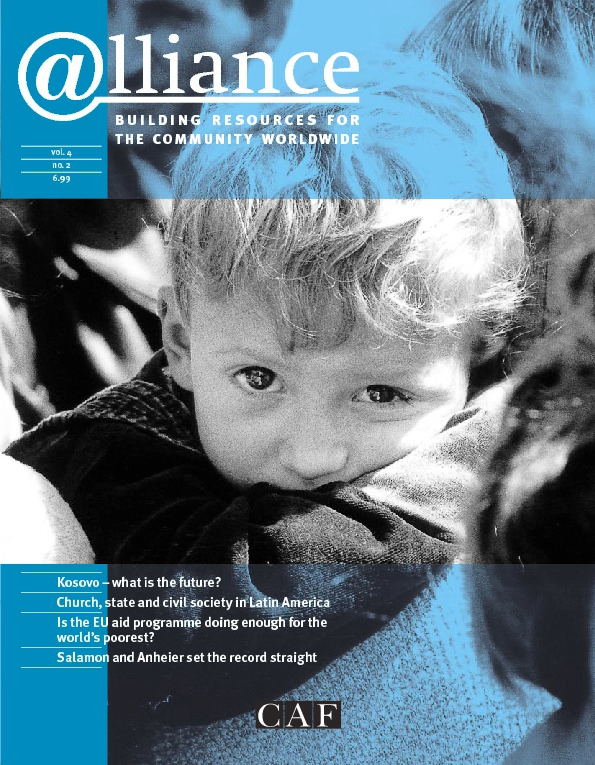Elkanah Odembo is a man with a mission. Establishing the Centre for Promotion of Philanthropy and Social Responsibility in Nairobi – a substantial challenge in itself – is for Elkanah only the means to a much more ambitious end. The key to understanding the ultimate goal of the Centre is in its lengthy name. Although Elkanah and his team will serve as a resource for the varied efforts under way in East Africa to promote organized philanthropy, it is the commitment to social responsibility that defines this new institution.
In one sense the Centre is a logical progression from the Africa Philanthropy Initiative, Ford’s project to map, bring together (in peer learning) and support emerging African grantmaking foundations. The project was led by Elkanah Odembo and run out of Ford’s Nairobi office, and it generated a considerable body of learning on which the new Centre will build. It also brought together for the first time a group of foundations in East Africa that will, like the Centre itself, be receiving planning grants from Ford over the next 12 months.
Supporting East African foundations
One of the principal tasks for Elkanah and his team will be to support these foundations in the year ahead as they use the flexible grant funding to develop ideas and strategies for strengthening their capacity and building their assets. One of the East African foundations, the Rattansi Educational Trust, is featured elsewhere in Alliance (see pp34-35). Others include the Kianda Foundation in Kenya, the Nyerere Foundation in Tanzania and the Kabaka Foundation in Uganda. In working with the seven East African foundations receiving planning grants, Elkanah will be drawing on the experience of larger, more established foundations such as the Kenya Community Development Foundation. One intended output of the Centre in the first year or two is the creation of an East African Grantmakers Association, maintaining the commitment to peer learning that is a constant theme of Ford’s own grantmaking.
Untapped spirit of generosity
If the origins of the Centre can be found in the Africa Philanthropy Initiative and a concern with the nuts and bolts of successful philanthropy – governance, skills, grantmaking practice – the zeal and passion with which it is being brought into being are explained by Elkanah’s belief in the untapped power of Africa’s ‘spirit of generosity’. This conviction, that throughout East Africa there are under-utilized resources in all communities, is in a sense a necessary precondition to the Centre’s efforts to promote philanthropy. But Elkanah goes much further, stating that ‘it is time to build a strong and self-reliant civil society in East Africa, a civil society that draws from individual citizens contributing money and goods, and volunteering their time and skills to promote the well-being of others and the improvement of the community in which they live.’
This is far removed from any narrow definition of philanthropy, and certainly a different dimension to Ford’s principal interest in organized philanthropies (grantmaking foundations). It is in effect the call for social responsibility that Elkanah insisted should be included in the name of the Centre.
A crusade for social responsibility
The crusade – for there is a crusading spirit to the Centre – for social responsibility on the part of all members of society needs to be understood in the context of East African civil society as it is today. On the one hand, Elkanah points to the new middle class of wealthy professionals who do not seem willing to ‘give something back’ to society, certainly not in the ways exemplified by earlier generations of business leaders such as Mr Rattansi. On the other hand, the burgeoning NGO sector has in the main failed to win public trust and confidence, and efforts by NGOs to raise funds within East Africa are met with suspicion. While there are of course many very effective NGOs, Elkanah is in little doubt that the sector as a whole needs to be much more transparent and accountable.
Taking forward this broader concept of social responsibility, the Centre will work with leading Kenyan companies to encourage corporate community engagement. It will also seek to mobilize a leading group of younger professionals – entrepreneurs, lawyers, people working in finance and other service industries – who can serve as mentors and advocates among their peers. At local level, a DFID-funded project will enable the Centre and Charities Aid Foundation to pilot an approach to mobilizing community-wide efforts to pool resources in meeting particular local needs. This project is profiled in the CAF Bulletin.
In the same way that it combines some very practical functions as a resource centre and a wider campaigning role, the Centre itself is something of a hybrid institution. It is a non-profit organization but one which will not look much like the average NGO. From the start the Centre will be developing plans to generate fee income as part of its long-term strategy. It will be cajoling and occasionally criticizing the private sector but it will do so in a language that business leaders can understand. Elkanah is equally unafraid to call the NGO sector to account, to be socially responsible itself.
The goals are ambitious and the social and economic climate unfavourable, but Elkanah and his team are sustained by genuine passion for their cause. With Ford’s backing, they will be taking one step at a time. The first, and crucial, step is to establish the Centre as a solid organization. To this end, CAF is acting as an institutional ‘midwife’, working with Elkanah to put in place the essential components of a healthy, effective organization.
In the next few issues of Alliance we will be following the progress of the Centre for Promotion of Philanthropy and Social Responsibility as a case study.
Andrew Kingman is International Director at CAF. He can be contacted by email at akingman@caf.charitynet.org
For more information about the Centre, contact Elkanah Odembo at eodembo@hotmail.com



Comments (0)